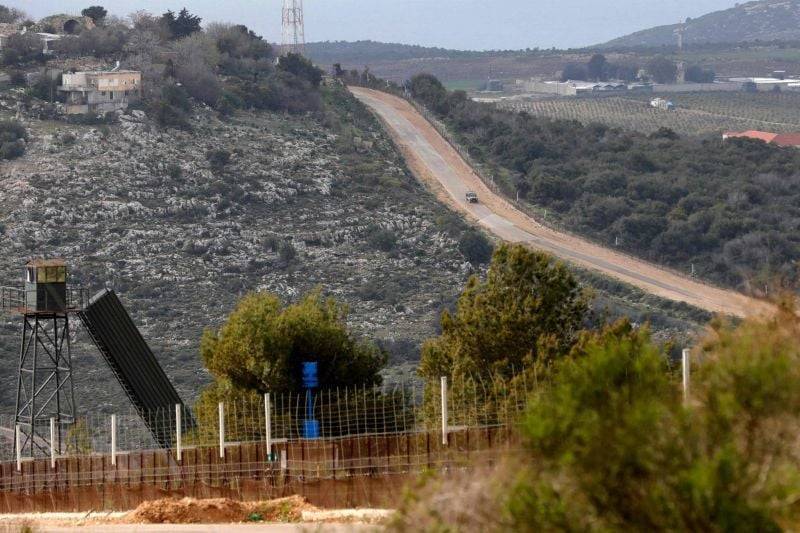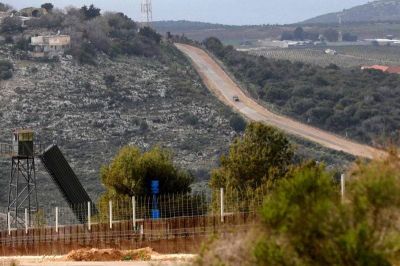
An Israeli patrol near the Blue Line in southern Lebanon, March 15, 2023. (Credit: Jalaa Marey/AFP)
BEIRUT — Tension on the border between Lebanon and Israel increased further on Thursday. Two rockets were fired from southern Lebanon towards Israel, according to Reuters, while the Israeli army, quoted by AFP, claimed it was a single unclaimed mortar attack.
The response was swift: the Israeli army bombarded southern Lebanon, targeting the area around the town of Kfarchouba with more than fifteen 155 mm shells, according to the state-run National News Agency.
A senior source in the Lebanese army told L'Orient-Le Jour early this morning that the group responsible for firing the rockets from Lebanese territory was Palestinian. He did not specify which organization was behind the attacks.
The source added that Palestinian armed groups "have underground hiding places for their rockets, allowing them to launch their projectiles without moving and without being spotted by the army."
"The army has deployed in the area to identify the group that fired the rocket and prevent further attacks," he added, dismissing the possibility of escalation.
This incident comes three months after the two countries experienced their biggest confrontation in recent years, following the firing of rockets from Lebanon into Israel.
Thursday's fire exchange was reported after Israel carried out one of its largest military operations in years in the Palestinian refugee camp of Jenin in the West Bank.
By Wednesday, tension had already risen at the border between Lebanon and Israel: at least three violations of Lebanese territory by the Israeli army took place within the span of a few hours. Israeli bulldozers crossed the technical fence at Maiss el-Jabal, Markaba and Wadi Honein and Israeli soldiers fired bullets into the air to scare off Lebanese citizens who tried to confront them.
Over the weekend, Israel seized the Lebanese part of the village of Ghajar, located on the border between Lebanon and the occupied Syrian Golan. Israel erected a fence to the north of Ghajar, cutting it off from Lebanon.
Lebanon's Foreign Affairs Ministry deemed it a violation of Resolution 1701. Hezbollah also recently set up two tents in the disputed region of the Kfarchouba Hills and the Shebaa Farms.
To shed light on the situation, General Hicham Jaber, retired military officer and President of the "Center for Middle East Studies and Research," answers L'Orient-Le Jour's questions.
How would you describe the situation along the border, in the light of the latest developments?
What happened on the Lebanese-Israeli border on Thursday was simply another aggression by Israel on top of many others. But I don't think it can be considered a declaration of war. The causes of this aggression lie in the complexity of the Israeli political scene, which is becoming unmanageable for Prime Minister Benjamin Netanyahu.
Israel is going through a very complicated political period. Although this government is one of the most extreme in its history, tensions have emerged within the cabinet over delicate security issues, particularly those relating to the Palestinians and the West Bank.
Faced with this, the Israeli Prime Minister finds himself in a situation where he needs a war to get out of it and unify the divided population in his country. He has been attacking Syria on a daily basis, as well as the Lebanese territories he is trying to annex, including Ghajar, which is Lebanese and not Syrian territory.
It is important to remember that the Blue Line which separates Lebanon from the occupied Palestinian territory delimits a zone which is supposed to be neutral and where no one, whether Lebanon or Israel, can access or send weapons. But Israel transgresses this rule on a daily basis, considering the zone to be its own.
As for the shells fired by Palestinians from Lebanon on Thursday morning, they were only small-calibre projectiles. Even if they fired forty of them, Israel's response would still be disproportionate.
Is there a link between the recent tensions along the Lebanese-Israeli border and the Israeli invasion in Jenin?
There is no link between the tensions on the border and the recent events in Jenin. Hezbollah supports the Palestinians politically, but not militarily. As for the statements made by Hezbollah's Secretary General (in which he threatened Israel with war in the event of aggression on Lebanese or Palestinian territory), these are merely political declarations.
What are Hezbollah's possible reactions, particularly following the installation of its tents in Kfarchouba?
There's very little chance of war breaking out anytime soon. Today, the Israeli Prime Minister wants war, but doesn't dare launch hostilities.
He fears the Americans and Russians, who have already warned him against an offensive in Lebanon. So he's trying to get Hezbollah to start the war, so that he can position himself as a defender. We mustn't forget that war has a fairly high cost, especially on the Israeli side, if Hezbollah were to target their oil installations. The consequences will be enormous, not only economically, but also for the Israeli population.
On Hezbollah's side, it is not in their interest, either internationally or in Lebanon, to be seen as the party that started the war.
Instead, the party positions itself as Lebanon's defender.

